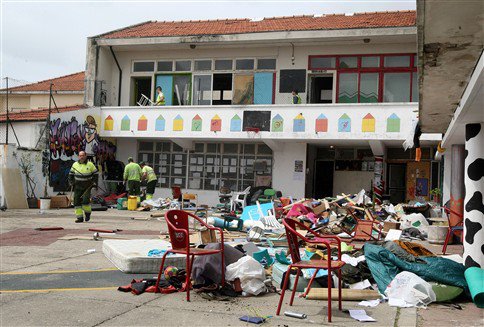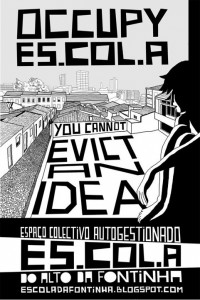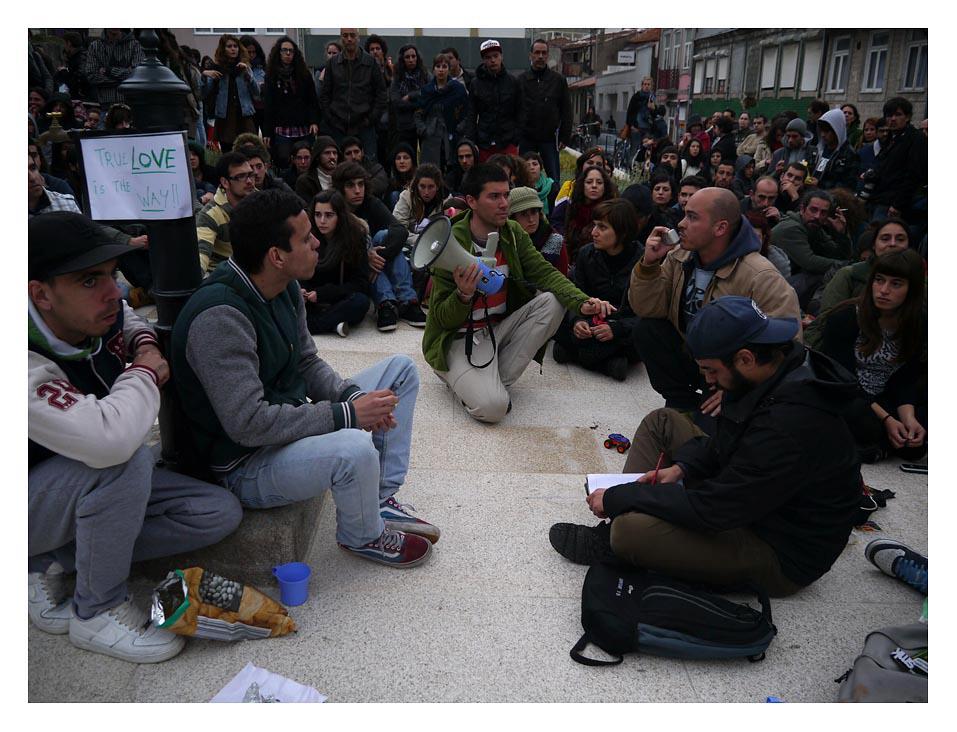This post is part of our special coverage Europe in Crisis [1].
The violent [2]eviction [2] of a self-managed community center in Porto by the police, on April 19, 2012, triggered a wave of solidarity beyond the borders of the former working-class neighborhood of Fontinha, left to oblivion for years.
After 15 police cars arrived with masked and armed riot police to evict the project (three participants were arrested and five were injured), and emptied the school destroying all material in the building (such as books, computers and furniture), only to board up doors and windows in the end, around 300 people took to the streets in Porto, and several dozens more in Lisbon.
 [3]
[3]Educational materials and furniture destroyed in the school yard before the garbage truck came. The windows and doors were boarded up afterwards. Photo shared by Antonio Serginho on Facebook.
The events opened the newscasts on TV, and social media was buzzing with reactions; the hashtags #Fontinha [4] and #ocupai [5] trended on Twitter in Portugal.
Building on an idea
Es.Col.A [6] (meaning school) [an acronymn for self-managed collective space, pt] was formed on April [7] 2011, by a group of citizens who squatted a public school that had been abandoned by the municipality of Porto in 2006. Journalist Nuno Ramos de Almeida reported [8] [pt] on April 20, that there are more than 25,000 housing buildings in the city left abandoned (about one in every five, which can be seen in this illustrative photo report [9]) – many of them under the responsibility of the City Hall.
Under the slogan “Free spaces, create alternatives”, the collective proposed to bring back to life a disused building with after-school classes, communal food and recreational activities [10] (ranging from yoga, music and capoeira, to film and debates). All based in principles of self-organization, free accessibility, non-discrimination, and practices of direct democracy and consensus through weekly Popular Assemblies.
Viva Filmes, a video-activism collective from Porto, published a short documentary [12] in which community members tell the story of Es.Col.A to the brink of eviction (with English subtitles):
In the beginning of February, the City Hall sent a note of eviction to Es.Col.A, urging the collective to empty the building by the end of March. While Es.Col.A released an open letter [14] [pt] rejecting the eviction, mobilization started under the motto “You cannot evict an idea” (which might have been inspired by the Global Voices post [15] with that same headline about the Bank of Ideas in London, UK, January 2012).
Under pressure, the City Hall sent a proposal of a new contract, which was also rejected [16] [pt] as it simply implied the legitimation of a later date for eviction of the collective – scheduled for the end of June.
The directions from the City Hall were clear: if not signed by April 12, from April 13 on, Es.Col.A would be removed. On that day Anonymous Portugal released a video [17] in support.
The expulsion would eventually take place in the morning of April 19, as around 120 riot police entered the building [18] [another video from a member on the ground here [19]], and put an end to the work of one year of the community.
The City Hall issued a statement [20] [pt] citing the necessity to “enforce laws” and calling the collective's squatting of the school “abusive” and “savage”, forcing authorities to intervene “coercively.” The statement made mention of the video above calling it “threatening” and “provoking disturbances and challenging [government] institutions.”
Meanwhile, a hiphop music video made by the youth of Fontinha sums up both the activities that used to take place in Es.Col.A, the April 19 events, and the popular reaction in Porto that followed:
Solidarity exceeds borders
Sympathy is coming from many cities in Portugal [21], where citizens have organized demonstrations [22] via Facebook, such as the following that took place in Lisbon, in the evening of April 19:
A call on Facebook [23] to make the cause go transnational was made by M31 (March 31), an European collective against capitalism that gathers groups across 12 countries. Messages of support, and in some cases translations, came from Spain (through the independent media collective La Haine [24] [es]), Sweden (the Anonymous collective @AnonOpsSweden [25]), United Kingdom (Socialist Workers Party via @tedsplitter [26]), Australia (@OccupySydney [27]), Greece [28] [el], Poland [29] [pl], and Germany, where an open letter [30] to the Mayor and the city government of Porto was published on Indymedia [30]:
You should know that the project and its activities are followed and supported with sympathy of many people outside Portugal. (…)
We ask that you reverse the eviction and repair the damage. Negotiate immediately with Es.col.a.-collective to reach peaceful and socially just solutions!
A petition [32] [pt] is in circulation. The Assembly of Es.Col.A gathered on the evening of April 20 with around 200 participants, and decided to reoccupy the building on April 25th [33], a national holiday that represents the end of the dictatorship in Portugal in 1974.
This post is part of our special coverage Europe in Crisis [1]


